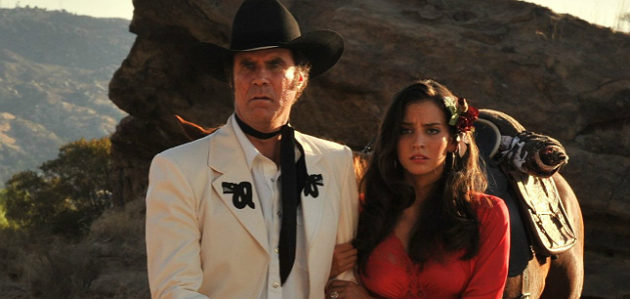Will Ferrell Explains the Origins of Casa de mi Padre, His Spanish Telenovela Comedy

Will Ferrell movies can usually be summed up as “Will Ferrell as a…” and you get it. Will Ferrell as a reporter? That’s funny. Will Ferrell as a NASCAR driver? Also funny. But Will Ferrell as a Spanish soap opera action hero? Casa de mi Padre is a Spanish language film starring Ferrell as a rancher’s son who goes to war with drug dealers to protect his brother’s girl (Genesis Rodriguez). Where, exactly, did he come up with this idea?
At the film’s press junket today, Ferrell said he’d had this idea for five to seven years. The inspiration struck him, as such ideas do, during a 2:00 a.m. channel surfing session. “I’m probably like so many people, turning on the television going through the channels at two in the morning and landing on a telenovela going, ‘What is this? Why are they so over the top? This is amazing,’” Ferrell said. “That’s my exposure to them. I’d always had this idea of that’s such a heightened, funny world that it would be really funny to see myself in that world. I thought God, you’ve never seen an American comic in a foreign language film and have them commit to it in a way that’s believable. I thought that’s something if you could pull it off, that would be an original movie.”
The TV dramas that pop up on Univision or Telemundo in the States take the drama pretty seriously. You can tell Ferrell thinks it’s funny by all the intentional mistakes (continuity errors, visible boom mics, stuffed animatronic animals and mannequin stand-ins) intentionally placed in Casa de mi Padre, which is written by Andrew Steele and directed by Matt Piedmont, both alumni of Saturday Night Live and Funny or Die.
“It technically really isn’t an homage to telenovelas,” Ferrell said. “Telenovela is kind of the broad description for it but it’s an homage to that, it’s an homage to the Mexican spaghetti western. It’s an homage to bad moviemaking, continuity mistakes. It’s an homage to overacting. It’s an homage to stuffed wild animals. Once we started writing the script and talking about how we were going to shoot the movie, we saw this was a real opportunity to play around with a bunch of different elements.”
The script by Steele was written in English, then the dialogue translated into Spanish. Ferrell only speaks en espanol; only an American character delivers a few lines of English. Of course, now Ferrell only remembers the naughty words.
“Chingado is a good one,” he said. “I love that word. Chinga this, chinga that. That’s a good word, but that’s commonly used. Chinga is the F word.”
Ferrell got over the language barrier on his first day of filming. “For some reason the schedule worked out to where I literally had like a two page monologue in Spanish on the first day. Once I got the first couple takes under my belt, and I could see people watching behind the monitors going, ‘His Spanish is OK. It’s not that bad.’ Then I thought oh, okay. I’m going to make my way through this. Had I kept up with the Spanish, I’d be really good right now. But I didn’t. I could make my way at a resort. At the Four Seasons in Mexico I’d probably be OK.”
Fulfilling his dream of starring in a Spanish language melodrama, Ferrell was proud to use his box office clout to get an outrageous film made. “This ranks up there as one of the things I’ve gotten to do which you can only be so lucky to be in a position to take risks like this.”
Casa de mi Padre opens March 16. Watch the trailer here.
Follow Fred Topel on Twitter.
Follow Movieline on Twitter.

Comments
on the lookout forwars to extra associated information, you will be killing writer who discuss the great concept to planet!